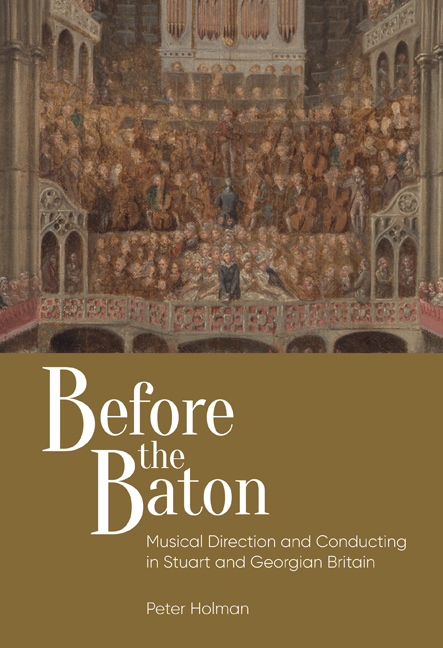Book contents
- Frontmatter
- Dedication
- Contents
- List of Illustrations
- Foreword
- Acknowledgements
- Note to the Reader
- List of Abbreviations
- Prelude To Beat or Not to Beat: The Continental Context
- Part I Directing Choral Music
- Chapter 1 ‘Heard but not Seen’: Leading Anglican Cathedral Music from the Organ
- Chapter 2 ‘With a Scroll of Parchment or Paper, in Hand’: Large- Scale Choral Music
- Chapter 3 ‘Accompanied all along on the Organ by his Own Inimitable Hand’: Handel and the Direction of his Oratorios
- Chapter 4 ‘The Conductor at the Organ’: The Oratorio Tradition after Handel
- Part II Directing Opera and Theatre Music
- Chapter 5 ‘That Ridiculous Custom’: From Devolved Direction to Centralized Time-Beating in Seventeenth-Century Theatre Music
- Chapter 6 ‘Il maestro al cembalo’: Directing Opera and Theatre Music from the Harpsichord
- Chapter 7 ‘A New Discipline and a New Style of Playing’: Directing Opera and Theatre Music from the Violin
- Chapter 8 ‘That Powerful Sovereign, the Conductor’: From the Piano to the Rostrum
- Postlude Superconductors or Semiconductors? Lessons for Today
- Bibliography
- Index
- Miscellaneous Endmatter
- Frontmatter
- Dedication
- Contents
- List of Illustrations
- Foreword
- Acknowledgements
- Note to the Reader
- List of Abbreviations
- Prelude To Beat or Not to Beat: The Continental Context
- Part I Directing Choral Music
- Chapter 1 ‘Heard but not Seen’: Leading Anglican Cathedral Music from the Organ
- Chapter 2 ‘With a Scroll of Parchment or Paper, in Hand’: Large- Scale Choral Music
- Chapter 3 ‘Accompanied all along on the Organ by his Own Inimitable Hand’: Handel and the Direction of his Oratorios
- Chapter 4 ‘The Conductor at the Organ’: The Oratorio Tradition after Handel
- Part II Directing Opera and Theatre Music
- Chapter 5 ‘That Ridiculous Custom’: From Devolved Direction to Centralized Time-Beating in Seventeenth-Century Theatre Music
- Chapter 6 ‘Il maestro al cembalo’: Directing Opera and Theatre Music from the Harpsichord
- Chapter 7 ‘A New Discipline and a New Style of Playing’: Directing Opera and Theatre Music from the Violin
- Chapter 8 ‘That Powerful Sovereign, the Conductor’: From the Piano to the Rostrum
- Postlude Superconductors or Semiconductors? Lessons for Today
- Bibliography
- Index
- Miscellaneous Endmatter
Summary
As often happens, a large research project starts with a single chance discovery, in this case a newspaper article from 1788 berating the composer Stephen Storace for trying to beat time in the wings of the Drury Lane theatre when he should have been at the harpsichord (Ch. 8). That led to a short preliminary article, published in 2006, and to everything in this book. At an early stage I planned a joint study with Fiona Palmer, but we quickly realised that our approaches were too different and the subject too vast. The result is two separate books: hers was published in 2017. Mine has taken longer that it should.
At first, I foolishly imagined it would be possible to cover all the types of public music-making in Britain up the beginning of modern-style baton conducting in the 1830s (hence my title Before the Baton), but I eventually realised that it was better to cover less in more detail. I have therefore focused on two strands: choral music and oratorio in Part I and opera and theatre music in Part II, with Handel as the central figure in both. In addition, the Prelude provides essential context, surveying practice on the Continent up to about 1700; and I have reached back into the seventeenth century for Ch. 1, 2 and 5. I even venture into the twentieth century in Ch. 1 to document the remarkable persistence of seventeenth-century methods of direction and modes of performance in Anglican cathedrals and collegiate foundations. Other aspects of British musical life, such as military bands, catch and glee clubs and amateur orchestral societies, would be fruitful subjects for future enquiry. Orchestral music hardly existed as a separately performed concert genre before the Philharmonic Society was founded in 1813. Before then public concerts typically mixed symphonies, overtures and concertos with various types of vocal music and what we would now term chamber music. I use a discussion of the Philharmonic Society in Ch. 8 as a case study of how an institution, founded with democratic principles and a devolved system of direction, was ‘modernised’ (or ‘perverted’ from my standpoint) in the 1830s and 40s by autocratic control from a single individual using a baton.
- Type
- Chapter
- Information
- Before the BatonMusical Direction and Conducting in Stuart and Georgian Britain, pp. xiii - xviPublisher: Boydell & BrewerPrint publication year: 2020

